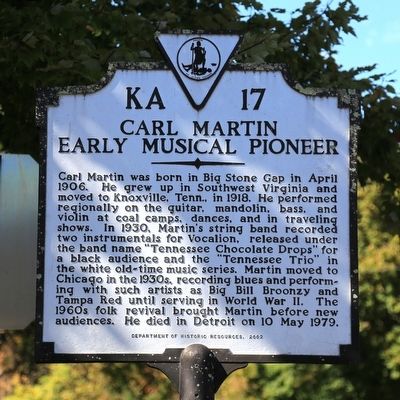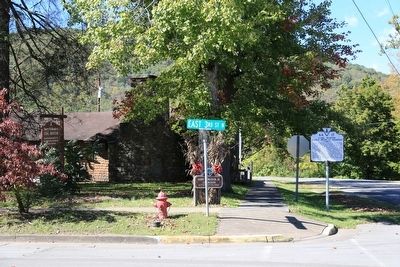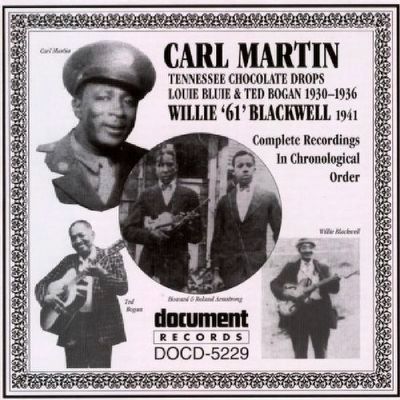Big Stone Gap in Wise County, Virginia — The American South (Mid-Atlantic)
Carl Martin
Early Music Pioneer
Erected 2002 by Department of Historic Resources. (Marker Number KA-17.)
Topics and series. This historical marker is listed in these topic lists: African Americans • Arts, Letters, Music • Entertainment. In addition, it is included in the Virginia Department of Historic Resources (DHR) series list. A significant historical year for this entry is 1930.
Location. 36° 52.022′ N, 82° 46.615′ W. Marker is in Big Stone Gap, Virginia, in Wise County. Marker is at the intersection of East 3rd Street North and Shawnee Avenue East on East 3rd Street North. It is in front of the Harry W. Meador, Jr. Coal Museum. Touch for map. Marker is at or near this postal address: 570 Shawnee Ave E, Big Stone Gap VA 24219, United States of America. Touch for directions.
Other nearby markers. At least 8 other markers are within 4 miles of this marker, measured as the crow flies. Big Stone Gap (approx. 0.2 miles away); Christ Episcopal Church (approx. 0.2 miles away); Origins of Big Stone Gap (approx. ¼ mile away); Southwest Virginia Museum (approx. 0.3 miles away); a different marker also named Big Stone Gap (approx. 0.4 miles away); Appalachia (approx. 2.7 miles away); Donelson’s Indian Line (approx. 3.8 miles away); Lee County / Wise County (approx. 3.9 miles away). Touch for a list and map of all markers in Big Stone Gap.
Regarding Carl Martin. Wikipedia entry: Carl Martin (April 1 or 15, 1906[2] – May 10, 1979) was an American Piedmont blues musician and vocalist, who was capable with a variety of instruments and musical styles.
Martin was born in Big Stone Gap, Virginia,
United States. He started making records with a number of groups including the Four Keys, the Tennessee Chocolate Drops, the Wandering Troubadours and as Martin, Bogan, and Armstrong.
Additionally he accompanied Chicago musicians such as Bumble Bee Slim and Tampa Red throughout the 1930s. His solo work recorded in the 1930s is also notable, songs such as “Crow Jane” and “Old Time Blues” feature his remarkable guitar accompaniment. From this decade onwards, Martin played regularly solo in the Chicago area, with his repertoire extending across blues, jazz, pop, country, and even non-English songs. He played second guitar behind Freddie Spruell, on the 1935 recording of the latter's song, “Let's Go Riding.” The track later featured in the soundtrack of the 2001 film, Ghost World.
Martin reunited with Bogan, and Armstrong in the 1970s, and played at folk and blues music festivals across the States. He died in Pontiac, Michigan, in May 1979, at the age of 73.
Folk artist Steve Goodman paid tribute to Martin in his song “You Better Get it While You Can.”
Also see . . .
1. Carl Martin - Complete Works. Audio CD on Amazon.com. This page includes some song excerpts. (Submitted on November 24, 2015, by J. J. Prats of Powell, Ohio.)
2. Farewell to You Baby - Carl Martin (1936, Chicago) Piedmont Blues Guitar. Click image to play.
Farewell to You Baby - Carl Martin (1936, Chicago) Piedmont Blues Guitar
Credits. This page was last revised on June 29, 2017. It was originally submitted on November 24, 2015, by J. J. Prats of Powell, Ohio. This page has been viewed 798 times since then and 37 times this year. Photos: 1, 2, 3. submitted on November 24, 2015, by J. J. Prats of Powell, Ohio.


